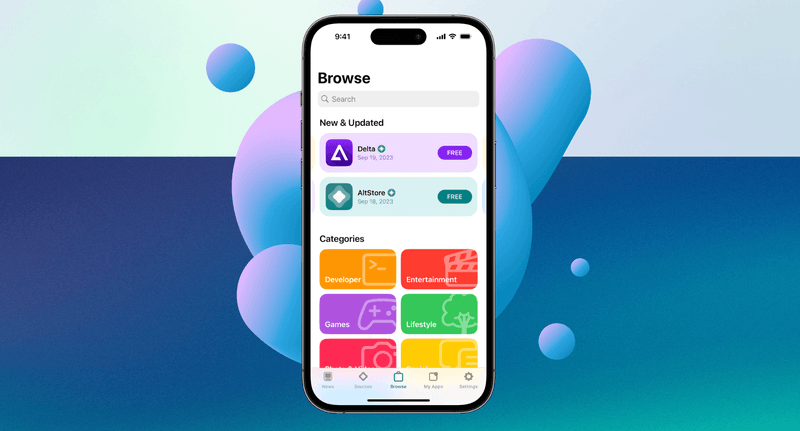Founded by Riley Testut, AltStore has made headlines as the first official third-party iOS App Store in the EU, launched in response to loosening App Store policies due to the DMA. Originally developed around five years ago to distribute Delta, Riley’s emulator not initially allowed on the App Store, AltStore has evolved beyond its roots to offer a native app experience.
This Q&A delves into the technical and operational insights of running AltStore, shedding light on what developers and users can expect.
Q&A with Riley Testut
RevenueCat: Could you discuss the logistics and technical details of setting up an alternative App Store like AltStore, along with Apple’s requirements?
Riley: The app is pretty straightforward technically. We use Marketplace Kit, which simplifies the process a lot. Basically, I just tell the system, “Here’s an app I want to download,” and then iOS handles the installation for us. The developers themselves host the apps after they’re notarized by Apple. They host these notarized apps on their servers, and then AltStore downloads these directly from there, which makes the system very decentralized.
As for the backend, it’s more complex. We handle all the licensing for the apps. Whenever an app is installed, we have to generate a license for it. We decide if the license is indefinite or if the app should expire after a certain amount of time. We’re not doing anything fancy right now, but there are a lot of capabilities. For example, AltStore can set an app to literally expire.
One key functionality that Apple supports through their APIs is allowing us to manage updates based on user activity. For instance, if someone’s subscription lapses, we can set it up so they can’t download the next year’s update, preventing unintended charges. This is crucial for managing resources and ensuring users who are not actively subscribing do not receive updates.
RC: What’s the unique pitch for AltStore? What types of apps do you think Apple will allow on AltStore that they might not allow on their regular App Store?
Riley: It’s hard to say precisely because the situation is evolving, but AltStore focuses on less corporate, more indie-type apps that don’t want the pressure of being on a massive platform like Apple’s App Store. We provide a platform where developers can post apps without the business-like atmosphere of the traditional app store, much like how SoundCloud differs from Spotify. It’s about providing a space for smaller, possibly niche apps and developers.
RC: What’s the feasibility and challenges for developers interested in distributing apps through alternate platforms like yours, especially in terms of Apple’s notarization and review process?
Riley: For developers, the experience of distributing with alternative app stores is pretty simple and similar to the regular App Store. But, if you have the option of placing your app on the regular App Store, it might not be worth pursuing an alternative unless you don’t have a choice, like in our case with Delta.
Regarding Apple’s requirements, our guidelines are simple: does your app pass Apple’s notarization process? If it does, you’re good for us. Apple checks for security and other crucial factors, which are what we would check for anyway. This simplifies our process because if your app is good enough for Apple, it’s good enough for us.
RC: Can you elaborate on the submission process for developers? Is it as simple as submitting a URL to an IPA file?
Riley: It’s a bit more structured than just submitting a URL. Developers must first contact us to get a one-time token to associate their account with us through App Store Connect. After establishing this relationship, they can submit their app for notarization. Once Apple approves it, we receive the processed app on our backend, perform basic security checks, and then publish it. This ensures a level of oversight and maintains the quality of apps on AltStore.
RC: What are the main differences between Apple’s notarization and the normal App Review process?
Riley: The notarization process often takes longer than App Review. For instance, submitting Delta for notarization might take a whole day, whereas App Review could be just a couple of hours. We have several apps waiting for notarization for weeks now. Essentially, it’s not very different from App Review at this point.
We also had to adjust our approach due to specific requirements from Apple. For example, we had an app rejected because it didn’t include mapping features, even though it used location services. We had to add a map tab to comply, which shows where users were when they used certain features of the app.
RC: Is there scrutiny over private API usage or any specific features during notarization?
Riley: Apple is focused on privacy and security. We don’t use secret or private APIs but use official APIs like Core Location for background tasks. Even then, Apple required us to add features that directly justify the use of such APIs. There’s a lot of back-and-forth with Apple, which can delay notarization. If they suspect the use of private APIs or other non-compliant practices, it could lead to rejections unless these are very well hidden.
RC: Are there concerns about content like emulator apps displaying copyrighted material, like Nintendo game screenshots?
Riley: We have a process to handle disputes and takedown requests, which was one of Apple’s requirements. It’s up to us to decide how to handle these requests.
RC: How are you handling the marketplace core technology fee? Are you forcing registration or payment before download?
Riley: We charge €1.50 a year to download and use AltStore, using Stripe and RevenueCat to get it all working — people just go to our website’s checkout page and, after paying, can download AltStore. This covers the core technology fee for both AltStore and Delta.
RC: What payment options are available for the apps themselves?
Riley: If you want an official thing through AltStore we have a Patreon integration. That’s our promoted way — we think indie developers especially should make a Patreon like we do. All of our apps are free but if you’re a patron you get access to beta versions and early access to features. And with the recent rule changes, developers that have no monetization in any of their apps (for the whole developer account), they don’t need to pay the core technology fee. But most apps, I would encourage a Patreon. Most apps are not going to get a million downloads, so I think it’s good that the fear is kind of gone because now you can just test it out. Once a user has downloaded an app, it’s up to you what third-party payment options you provide.
RC: What do you think about the user response to apps that want to switch to operating from a third-party app store?
Riley: It’s a lot of work to go outside the App Store, and you’re likely to upset your users. This model really makes sense mostly for apps that aren’t typically found on the App Store or indie apps. For existing apps already in the App Store, switching over could lead to a lot of churn.
RC: And what about content that might not be suitable for children, like adult content?
Riley: We haven’t heard anything, but we would absolutely accept it. I think it’s a good example of something that’s weird that it hasn’t yet existed. And then also we get to have some flexibility because of our setup where you need to find all the apps yourself because it’s decentralized. It’s up to you to find a source from a developer. And then once you add a source, then you get all of their apps from that source. It’s a really good middle ground, honestly, for these kinds of things that should exist.
Summary
After our discussion with Riley Testut, it’s clear that AltStore serves distinct purposes: it provides a platform for apps that may not comply with the official App Store’s policies, and it offers an alternative space for indie developers seeking a less business-like environment. For those whose apps align with Apple’s regulations and business model, the traditional App Store might still be the preferred choice. However, AltStore presents a valuable option for developers looking for flexibility and a focus on niche communities.

